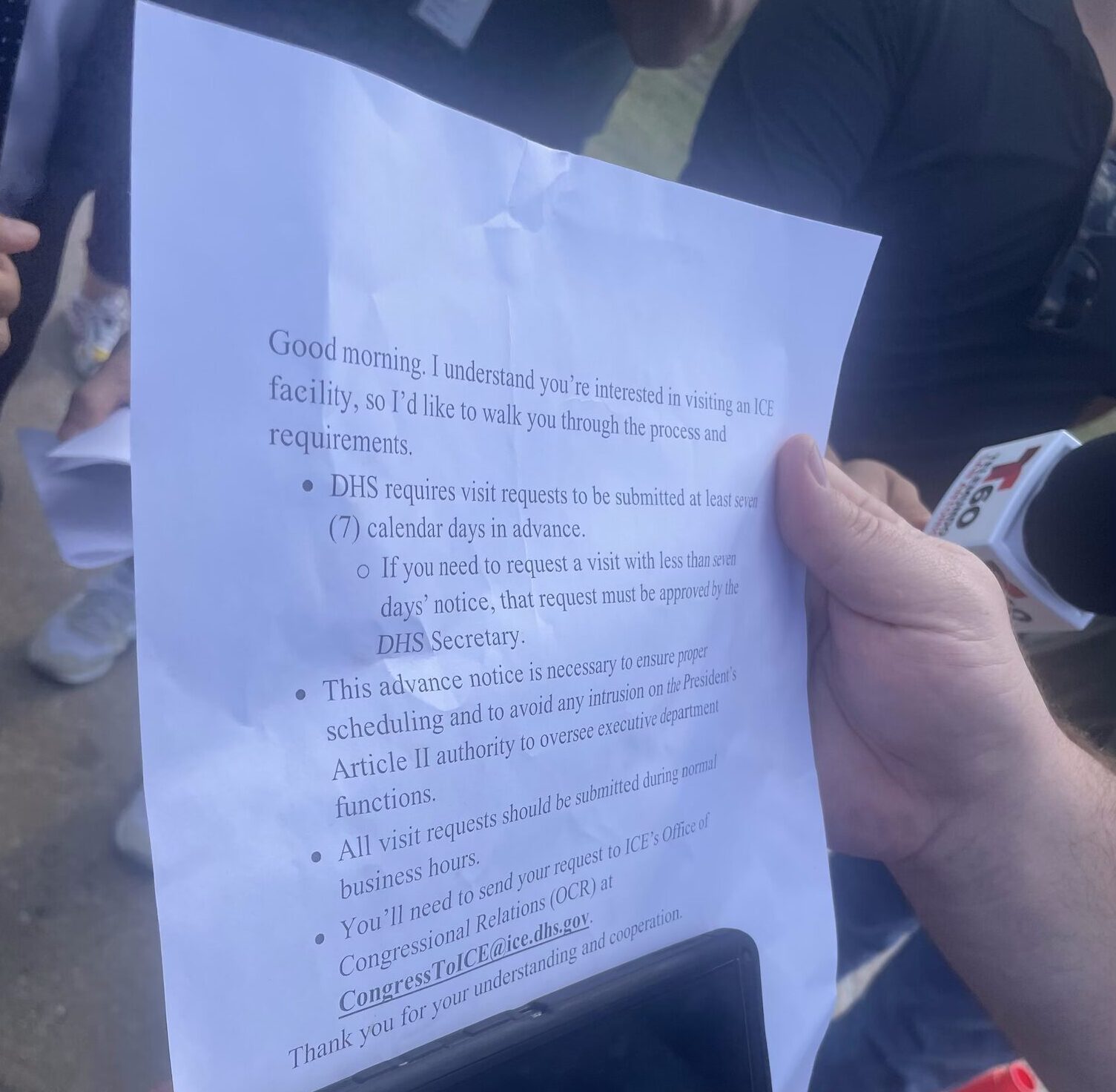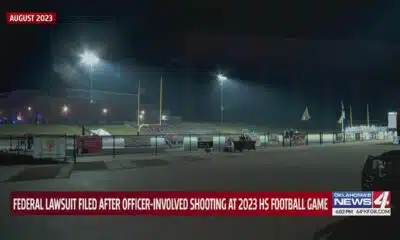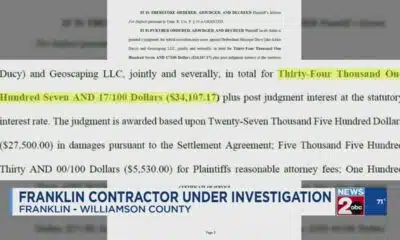News from the South - Texas News Feed
Texas’ abortion bans are here to stay despite challenges
“Texas’ abortion bans are here to stay despite narrow clarification” was first published by The Texas Tribune, a nonprofit, nonpartisan media organization that informs Texans — and engages with them — about public policy, politics, government and statewide issues.
Sign up for The Brief, The Texas Tribune’s daily newsletter that keeps readers up to speed on the most essential Texas news.
Standing before the Texas House of Representatives, Rep. Charlie Geren laid out his long history of voting for anti-abortion bills. He lauded the fact that Texas doctors could face up to 99 years in prison for performing an illegal abortion, saying “they would deserve it.” He stressed that he was, in no way, interested in promoting abortion.
Bonafides established, Geren turned to presenting a bill to narrowly clarify the state’s near-total abortion ban, ensuring pregnant women who were otherwise going to die, likely taking their fetus with them, could receive life-saving abortions.
The bill passed, to the great relief of doctors and hospitals who have been nervously treating complicated pregnancies under threat of life in prison for the last three years. But despite all the politicking required to get the legislation over the finish line, Texas’ abortion laws have not meaningfully changed.
And if this session was any guide, abortion advocates say, they won’t be changing anytime soon.
“Texas is still a state with an abortion ban, and an abortion ban is just an abortion ban, period,” said Shellie Hayes-McMahon, executive director of Planned Parenthood Texas Votes. “I can’t really celebrate what is like an arsonist bringing a cup of water to a fire.”
The overturn of Roe v. Wade was supposed to be a disaster for Republicans. These laws wouldn’t stand, common wisdom held, and if they did, they would cost candidates responsible for them dearly at the ballot box. Women would die, doctors would flee and anti-abortion groups would be cast out of the party’s inner circle, blamed for the forthcoming public relations crisis.
But three years later, the lawsuits seeking to overturn or amend the abortion bans have fizzled. Elections have only further entrenched lawmakers who enacted these laws in the first place. And when it came time to negotiate this amending legislation, anti-abortion groups were at the negotiating table.
Steve and Amy Bresnen, lobbyists for the bill, said they started with bigger ambitions, like adding in more exceptions and removing the life-threatening requirement.
“But if you do the work we do, you realize you have to go get what you can get,” Steve Bresnen said. “We’re not Gandhi. We’re not Jesus. We’re not Mohammed.”
Litigation and elections have failed to change laws
When Roe v. Wade was overturned in 2022, Lauren Miller was sure this wouldn’t stand. She didn’t yet know she was pregnant, let alone that she would soon need to call on protections that were no longer available to her. But as a seventh-generation Texan who had watched the rising tide of anti-abortion legislation, she’d gotten used to the idea of some higher authority swooping in to save the day.
“I didn’t think they’d undo the fall of Roe, because groups spent decades getting to this point,” she said in 2023. “But I thought all the voices would rise up against it, unified, and that would make a difference.”
Three years — plus a doomed pregnancy, a frantic trip to Colorado, a lawsuit, a Congressional testimony, campaign appearances, and a season fighting at the Legislature — later, and Miller’s usually indefatigable faith in Texas has waned a bit.
“We got a few scraps,” she said about the clarifying bill. “It’s frustrating to tell your story and feel like nothing is changing. I feel like the failures of the Texas Legislature are going to have to impact [everyone] personally before they realize they can’t keep voting for these people.”
“And that could take a long time,” she added.
Without the safety net of Roe v. Wade, an initial lawsuit challenging one of Texas’ abortion bans sputtered quickly. Two others, challenging the 2021 ban and seeking to protect abortion funds, are slowly crawling through the court system.
The most significant suit came from 20 women, including Miller, who said they were denied medically necessary abortions. Compared to pre-Dobbs litigation, this suit was narrow, asking the court to find the laws were unconstitutional as they applied to complicated pregnancies. The same lawyers also sued on behalf of Kate Cox, a Dallas mother of two who was experiencing medical complications related to carrying a non-viable pregnancy.
The Texas Supreme Court ruled against Cox, and later, against the 20 women.
“I never have expected a silver bullet, a single death, a single case, to change everything overnight,” said Molly Duane, senior counsel for the Center for Reproductive Rights, which brought those suits. “That’s not how change happens in this country.”
Despite these losses in court, Duane said she remains optimistic that the same outrage that forced lawmakers to consider a clarifying bill may also begin to translate into election results, slowly changing the makeup of the legislature that creates the laws and the courts that interpret them.
Texas’ abortion laws are extremely unpopular, with as many as 80% of voters saying they’d like to see additional exceptions, and Democrats have tried to capitalize on that dissonance.
But so far, that strategy hasn’t panned out in Texas. In 2022, Abbott and Paxton sailed to reelection, alongside the usual cadre of conservative candidates, and in 2024, even as stories emerged of women who died as a result of these bans, Republicans swept the board nationwide.
Voters can’t put an issue on the ballot in Texas, the way they can in other states, so the only real path to change is through winning elections.
“It’s very easy for people to get demotivated in these election cycles,” said Hayes-McMahon. “We’ve gained over 100,000 supporters since Roe fell, but we have to educate all people more, have to help them understand who they are voting for and why it matters.”
Few paths remain
While litigation and elections were failing to move the needle, the Bresnens were looking at other avenues for change. The longtime capitol lobbyists started by asking the Texas Medical Board to clarify rules for doctors, and when that didn’t satisfy them, they turned to unlikely allies in the fight to restore abortion access — the Texas Legislature.
“Because of the additional media attention, we thought this might be the time to strike and at least get an inch or a yard and just take back what we can, so to speak,” Amy Bresnen said.
The Bresnens are personally supportive of abortion. But they’re also realists who were clear-eyed about how much change they’d be able to push through in one session — and who they’d have to involve to get there. Sen. Bryan Hughes, chief architect of many of Texas’ strictest abortion bans, carried the legislation. Anti-abortion groups were at the negotiating table; women like Miller were not.
“I hear some of these groups saying, ‘Sure, this will save some lives, but…’” Amy Bresnen said, referencing pushback from abortion supporters. “There’s no ‘but’ for us. If this will save some lives, we have to take it.”
She said she was grateful to the women who had shared their stories and helped force the issue for legislators, and hoped to return to ask for more in future sessions. Some abortion advocates applaud the incremental gains, while others reject it as political posturing from Republicans looking to distance themselves from the worst impacts of the ban.
“I think it was all just a political ploy so they could go into the midterms and say they fixed the bans,” Miller said.
She wants to believe this is the beginning of a slow whittling away at these bans. But it’s hard to see that future when she looks at the current makeup of the chambers and the work it took to get this bill through.
“I know you have to eat an elephant one bite at a time, but we’re going to have to take much bigger bites,” she said. “The current situation is just dangerous. It’s not tenable.”
John Seago, the executive director of Texas Right to Life, said his group doesn’t see this as the opening gambit in a larger rethinking of the abortion laws. There are some areas they’d be willing to continue to discuss, like how the laws are interpreted in cases like Miller’s, where one twin is threatening the life of the other. But their primary focus is on restricting access to illegal abortions.
“There were problems that we needed to address with [SB] 31, and I was very happy with the line we were able to walk on that,” he said. “But to make progress, to move forward, we really need to move on abortion pills.”
A major bill to crack down on abortion pills, also carried by Hughes, failed to pass this session, much to Seago’s frustration.
But if he and Miller agree on one thing, it’s that they don’t want people getting the impression that the Texas Legislature is getting soft on abortion.
“I need people to not fall for this and think it’s all fixed now,” Miller said. “And I really need us all to get a little bit louder about having our rights taken away.”
Disclosure: Planned Parenthood has a been financial supporter of The Texas Tribune, a nonprofit, nonpartisan news organization that is funded in part by donations from members, foundations and corporate sponsors. Financial supporters play no role in the Tribune’s journalism. Find a complete list of them here.
Big news: 20 more speakers join the TribFest lineup! New additions include Margaret Spellings, former U.S. secretary of education and CEO of the Bipartisan Policy Center; Michael Curry, former presiding bishop and primate of The Episcopal Church; Beto O’Rourke, former U.S. Representative, D-El Paso; Joe Lonsdale, entrepreneur, founder and managing partner at 8VC; and Katie Phang, journalist and trial lawyer.
TribFest 2025 is presented by JPMorganChase.
This article originally appeared in The Texas Tribune at https://www.texastribune.org/2025/06/10/texas-abortion-ban-repeal-exceptions-unlikely/.
The Texas Tribune is a member-supported, nonpartisan newsroom informing and engaging Texans on state politics and policy. Learn more at texastribune.org.
The post Texas’ abortion bans are here to stay despite challenges appeared first on feeds.texastribune.org
Note: The following A.I. based commentary is not part of the original article, reproduced above, but is offered in the hopes that it will promote greater media literacy and critical thinking, by making any potential bias more visible to the reader –Staff Editor.
Political Bias Rating: Center-Left
The content presents a critical view of Texas’ restrictive abortion laws and highlights the challenges faced by abortion advocates and those seeking exceptions in the state. While it includes perspectives from anti-abortion lawmakers and groups, the overall tone emphasizes the difficulties in securing broader abortion rights and frames legislative efforts as minimal or insufficient. The inclusion of voices advocating for increased abortion access and critiques of the status quo, alongside acknowledgment of political realities, places this reporting within a Center-Left perspective. It reflects concerns common in center-left coverage about reproductive rights while maintaining a focus on legislative and political context without overt partisanship.
News from the South - Texas News Feed
'Bathroom bill' advances in Texas House days after tensions flared at hearing
SUMMARY: A Texas House panel approved Senate Bill 8, limiting transgender people’s use of bathrooms in government buildings, marking the first House advancement of a “bathroom bill” in over eight years. The bill, backed by Gov. Greg Abbott, passed 9-3 in committee and now heads to the House floor. SB 8 imposes penalties on institutions allowing restroom use not matching sex assigned at birth and extends restrictions to schools, universities, shelters, prisons, and jails. Opponents warn it promotes harassment and violence, while supporters cite protection of women and children. The bill includes measures to shield it from legal challenges. Lawmakers must pass bills by Sept. 13.
The post 'Bathroom bill' advances in Texas House days after tensions flared at hearing appeared first on www.kxan.com
News from the South - Texas News Feed
Texas House Republicans vote against retroactive punishments for quorum breakers
SUMMARY: A week after Texas House Democrats fled to block Republicans’ redistricting vote on the “Big, Beautiful Map,” Republicans are pushing bills to punish or prevent future quorum breaks. Proposed measures include banning fundraising during quorum breaks, vacating seats after seven unexcused absences, and lowering the quorum threshold from two-thirds to a simple majority. While Republicans support these bills, they failed to censure the Democrats. Democrats face fines exceeding $9,000 each for their absence, including costs for Texas DPS efforts to return them. Additionally, a Senate proposal aims to ban fundraising during special sessions to deter quorum breaks and save taxpayer money.
Read the full article
The post Texas House Republicans vote against retroactive punishments for quorum breakers appeared first on www.kxan.com
News from the South - Texas News Feed
Dems in Congress Are Being Denied Access to ICE Facilities. Now They’re Suing.
At least a dozen Democratic members of Congress have been denied entry to federal immigration facilities this year when they showed up to conduct oversight as President Donald Trump has ramped up his mass deportation efforts. Now, they are suing the Trump administration.
The lawsuit was filed in the federal district court for the District of Columbia on July 30 by 12 Democrats from the House of Representatives, including El Paso Congresswoman Veronica Escobar, who has provided oversight of such facilities for several years.
“As part of its campaign of mass deportation, the Trump-Vance administration has stretched the U.S. immigration detention system far beyond its capacity. More people are being held by the United States in immigration detention than ever before, with many facilities housing more individuals than they were built to contain,” the lawsuit states. “Reports of mistreatment have been widespread and have included disturbing details of overcrowding, food shortages, lack of adequate medical care, and unsanitary conditions.”
Since 2019, Congress has adopted statutory provisions stating that the Department of Homeland Security (DHS) may not use federal funds may to prevent members “from entering, for the purpose of conducting oversight, any facility operated by or for the Department of Homeland Security used to detain or otherwise house” noncitizens, per the lawsuit. Those mandates for unfettered oversight were a direct response to Trump’s attempts to block members of Congress under his first administration.
However, since June, several members of Congress have been turned away when attempting to enter and examine federal immigration facilities, including privately run detention centers and ICE field offices where immigrants have been detained.
Escobar currently serves on the House Appropriations Committee and its Subcommittee on Homeland Security, which oversees DHS. In her six years serving Congress, she and her staff members have conducted numerous visits to DHS facilities, and identified issues that saved taxpayers money or improved facility conditions for detainees. Prior to this year, she had only been turned away once, in 2019, from a facility when attempting to conduct oversight.
“It is not acceptable for the Trump administration to ignore the law and limit Congressional oversight and authority; this cannot go unchallenged,” Escobar said in a statement announcing the lawsuit.
U.S. Representative Greg Casar, an Austin Democrat, is among the latest members of Congress to be turned away when requesting to conduct oversight. On August 15, Casar attempted to access the Don T. Hutto Detention Center in Taylor, which is operated by DHS contractor CoreCivic, after receiving complaints that the air conditioning was not functioning properly and that detainees were “boiling.” The congressman, along with Austin-based attorney Andrea Jarero, who was trying to visit a client, were both denied access by CoreCivic.
When journalists, activists, Casar and his staff arrived at the detention facility, CoreCivic employees had blocked off access to the building’s parking lot with traffic cones and two white vans. A CoreCivic employee exited his vehicle and told Casar he’d need to schedule any visits at least seven days in advance. “This advance notice is necessary to ensure proper scheduling and to avoid any intrusion on the President’s Article II authority to oversee executive department functions,” the employee said, reading from a piece of paper.
The statutory provisions of recent DHS appropriations bills explicitly say that they may not “be construed to require a Member of Congress to provide prior notice of the intent to enter a [DHS] facility.” However, per the lawsuit, the Trump administration has unilaterally enacted a new policy that requires seven calendar days’ notice ahead of any visit to a DHS facility.
“What are they hiding, if they will break the law and not let a member of Congress in?” Casar said. “What are they hiding if they’ll violate constitutional rights and not let a lawyer in?”
Casar said that he intends to join his fellow Democratic members of Congress as a plaintiff in the lawsuit—though he has not done so yet.

Texas has the largest immigration detention capacity in the country, putting the state on the front lines of Trump’s mass deportation agenda. As of early August, more than 13,000 immigrants were detained in Texas facilities, according to data from the Transactional Records Access Clearinghouse (TRAC)—far more than any other state. That number will likely continue to grow: a new, $1.24-billion immigrant detention camp opened last week on Fort Bliss, a military base in El Paso, and is poised to be the nation’s largest once it reaches its full capacity to hold 5,000 people. (Escobar was allowed to access that facility on August 18 and said it held 1,000 detainees at that time, though she was not able to speak to any.)
Recent events bring new urgency to immigrant detention inspections: As of late June, 13 people had died in ICE detention this fiscal year—which is the same amount of deaths for the entirety of fiscal year 2024. (A report from several advocacy groups found that dozens of deaths between 2017 and 2021 in ICE detention facilities could have been prevented with adequate medical care.)
Additionally, more people are detained in ICE custody than ever before, and that number will likely continue to grow. The agency is also set to receive historic levels of funding; HR 1, Congress’ recent tax cuts-and-spending bill, contains $75 billion for ICE detention and removal operations.
As spending ramps up, oversight mechanisms have been stifled. Earlier this year, the Trump administration gutted some of the entities tasked with facility oversight, including the Office of the Immigration Detention Ombudsman. Escobar, the El Paso Democratic House member, said oversight is supposed to be multi-layered, but now “Trump has effectively done away with government watchdogs,” she told the Texas Observer.
Since the other agencies tasked with holding DHS accountable in detention centers have had major staff cuts, the role of members of Congress in conducting oversight of immigration detention is more important than ever, she said.
“There’s absolutely no reason for [DHS Secretary] Kristi Noem to block members of Congress from our legal ability to enter a facility unannounced,” Escobar said. “Unless she believes she has something to hide.”
The post Dems in Congress Are Being Denied Access to ICE Facilities. Now They’re Suing. appeared first on www.texasobserver.org
Note: The following A.I. based commentary is not part of the original article, reproduced above, but is offered in the hopes that it will promote greater media literacy and critical thinking, by making any potential bias more visible to the reader –Staff Editor.
Political Bias Rating: Center-Left
The content primarily focuses on criticism of the Trump administration’s immigration policies and their handling of oversight for immigration detention facilities. It highlights Democratic lawmakers’ efforts to conduct oversight and challenge restrictions imposed by the administration, emphasizing issues such as overcrowding, inadequate medical care, and detainee mistreatment. The piece also underscores government watchdog reductions under Trump and conveys skepticism toward officials enforcing access restrictions. While it presents factual information and quotes from Democratic representatives, the overall tone and framing favor a progressive viewpoint critical of conservative immigration enforcement, aligning it with a center-left bias.
-
News from the South - Alabama News Feed7 days ago
U.S. agriculture secretary announces end to subsidies for solar panels on farmland
-
News from the South - Kentucky News Feed6 days ago
First of its kind clinical trial offers new hope for Kentuckians at risk of dementia
-
Our Mississippi Home6 days ago
MSU Unveils Mixed-Use Development Featuring Boutique Hotel, Cultural Landmark
-
News from the South - Georgia News Feed7 days ago
Don't eat this shrimp sold at Walmart due to possible radiation contamination: FDA
-
News from the South - Arkansas News Feed7 days ago
Cities across the US are embracing AI guidelines for local government workers
-
News from the South - Arkansas News Feed6 days ago
‘Alligator Alcatraz’ probed by Dems as ICE detention centers multiply in states
-
News from the South - Alabama News Feed6 days ago
Grants to boost local emergency alert systems in question as public media agency closes
-
News from the South - Arkansas News Feed5 days ago
New I-55 bridge between Arkansas, Tennessee named after region’s three ‘Kings’












































